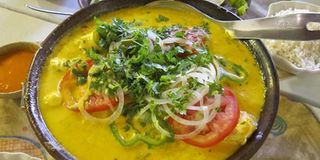Prime
Typical unique foods

One of the most famous dishes in Salvador Brazil.
What you need to know:
RELISH. An introduction to the food scene and the dishes you cannot miss when you visit Salvador de Bahia, Brazil.
In America, the southwest is well-known for its delicious Mexican food, and the residents of Tucson, Arizona, proclaim their city as the “Mexican food capital of the U.S”. The city has its own version of Tex-Mex food, which it calls Arizona-Sonoran cuisine. In the past, southern Arizona was once part of the Mexican state of Sonora, this style is considered the “soul food” of Arizona.
Think of Brazil and one thinks of soccer, samba, bossa-nova, beaches and carnival. People tend to group Brazilian cuisine in the same milieu as Latin American food and for this they should be forgiven: they all share the similar and common ingredients.
To get a better understanding of Brazilian fun, one has to understand Brazil: unlike the rest of South America that was colonised by Spain, Brazil was colonised by Portugal. The cuisine of Brazil is represented by three different cultures viz. the Portuguese, the Africans (these were purposely brought over to serve as a cheap source of labour mainly in agriculture) and the native Indians.
The Portuguese brought their love for salt cod, linguica, soups, stews and lots of sweets that are mostly based on egg yolks and sugar. The Africans brought their love for palm oil, peanuts, cashews, rice and beans, and carne seca (dry meat). The native Indians brought their love yucca, coconut, fish, spices and exotic fruits.
In multicultural Brazil, the coastal city of Salvador, the capital of the state of Bahia, enshrines the nation’s African heritage in its distinctive cuisine, dance, music and religious practices. It is set among palm-shaded beaches and spectacular Baroque buildings that are painted in brilliant and ornate shades of blue, turquoise, pink and ochre.
Salvador is famous for capoeria, a style of martial arts disguised as a dance. Legend has it that it was first developed by African slaves in order to secretly train to fight their masters! Today, it is considered a form of exercise, involving kicking motions and flips performed to the sound of a slender one-stringed instrument called a berimbau.
Food in Salvador
The slaves also created mystical Afro-Brazilian religions such as candomble that merges their own deities with the Catholic saints imposed by their masters. EveryFebruary2, candomble believers, dressed in white cast jewellery, flowers, perfume, and other feminine trinkets set out to sea to satisfy the alleged vanity of the ocean goddess, Yemnaja. Africa also resonates through Salvador’s love of percussion, especially the vibrant sound of Oludum, a renowned group of drummers whose fame has spread far their native city.
The food of Salvador has its own flavour, thanks to the use of oil from the dende palm, an African native that has thrived in northeast Brazil’s dry heat. Okra, manioc flour, peanuts, coconut milk, malagueta chilies and dried shrimp appear in local dishes such as vatapa, a chicken of sea food stew, carunu de camarao, featuring dried and fresh shrimp and acaraje, a deep fried bean pastry embellished with hot sauce.
DID YOU KNOW?
Salvador da Bahia has a Portuguese and African heritage which is reflected in its gastronomy and customs. Elements such as coconut milk, palm oil, ginger, and pepper, are present in the dishes of the region, which are prepared with different cooking techniques.




